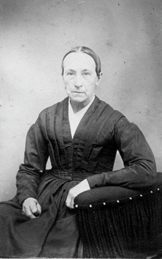‘A Portion of Nature’

Ann Preston
It is 1864. Swarthmore College has a charter, and it has a piece of land. The only things left are to build and equip College Hall (now Parrish), find and hire a faculty, recruit students, and raise more money. Swarthmore College would not open for classes until fall 1869, but there was still plenty to celebrate. One fine June 1864 day, the Friends Social Lyceum organized a visit to the new site, complete with lectures on science and history and a poem written for the occasion by Ann Preston. Preston began her public career in the 1840s, writing anti-slavery books. When medical education was made available to women, she became one of the first to earn a Ph.D. in the United States. Later, she became the first woman dean of a medical college.
Preston’s poem begins with a reference to rumors of battles, noise, and strife. The year 1864 was the bloodiest of the Civil War. She, like the other founders of Swarthmore, is fond of nature but, true to her scientific bent, shows her curiosity about the interior structures of nature. Nature is to be enjoyed but also, as part of that enjoyment, to be studied.
Her poem’s ending might be said to represent a continuing Swarthmore College value. The College community is not noted for the “sameness” of our students and faculty and, though some members of the community may disagree, there is still harmony.
Poem for Swarthmore, 1864
From rumors of battles, from noise and from strife,
From the wearing care of our working day life,
In this beautiful spot, on June of the year,
As a portion of Nature, ’tis good to be here.
Oh, this old dress of Summer! How fresh and how new
In its drapery green, and its covering of blue
How distinctive each tree to the breeze yields its tone
And by odor peculiar may each one be known,
And their music and fragrance blend sweet on the air
And marvellous beauty wakes the spirit of prayer.
But all this completeness—this charm of the whole,
The glory and grace that so speak to the soul
Depend upon this,— that each plant and each tree
Has a beauty interior to all that we see;
That, with roots in the earth and leaves to the sun,
It grows by a law that is sure for each one,
And the tiniest cell, hid away from the sight,
In perfect proportions, is builded aright.
We may learn the deep lesson from forest and glen,
That harmony cometh, and order ’mong men,
Not from sameness of pattern and outward control,
But from each one obeying the law of his soul:
Thus only his being makes sweeter our sod,
Thus he grows like a tree in the garden of God.
 Email This Page
Email This Page